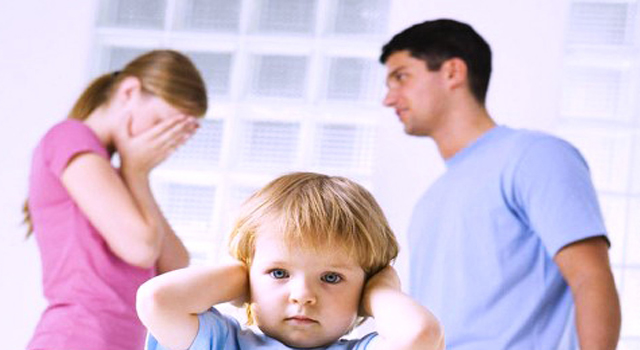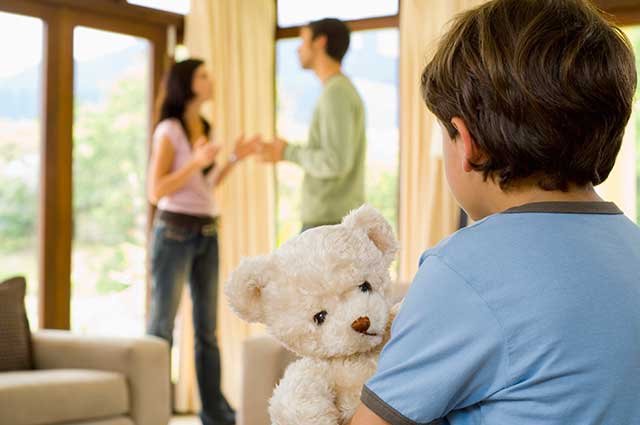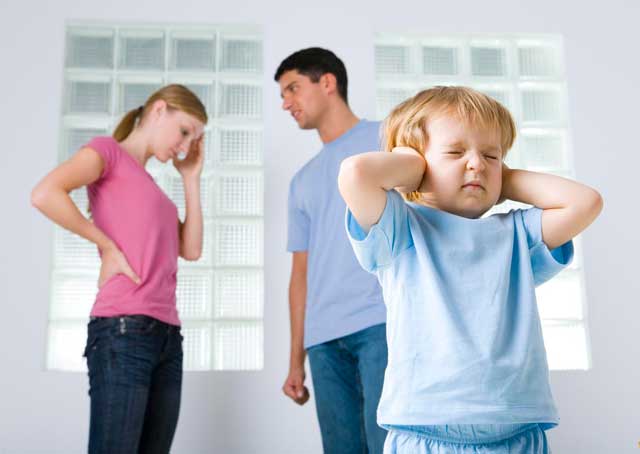It’s not easy to tell your child that parents are getting divorced. Perhaps this conversation will be one of the most difficult in your life. Even if adults understand that divorce is inevitable, they constantly quarrel or have already left, the children cannot even imagine the breakup of the family. After all, they lived with you from birth, it is natural for them, but it cannot be otherwise.

Many people think that divorce is an everyday matter, soon everything will be fine, and after a couple of years the child will forget what they told him. Psychologists explain that the decisive conversation will be deposited in memory forever. There is no way to make the divorce of mom and dad painless for a child. There is no universal method that would allow the child to more easily survive the separation of parents. You can formulate certain rules of behavior that often help, only they need to be adjusted taking into account the characteristics of the family.
When to tell a child about parental divorce
It is better to inform the child about the emerging divorce in 2-3 weeks. At this point, you will already be sure of your decision, and your child will have time to adapt to the changes. Equally important, he will not have the feeling that he has remained aloof.
Do not start a conversation in a hurry - on the way to school, in the morning when you are going to work, or in the evening before going to bed. Select a day off for the conversation. Then both mom and dad will have the opportunity to reassure the child and answer questions that he will definitely have.
Team up to talk with baby
Despite the problems in the relationship, parents should reject the grievances that have arisen, reproaches, and together calmly tell the child about what is happening. Even if divorce is the initiative of one of the spouses, tell the child that this is your common decision. Use the pronoun “we” more often to explain why you are getting a divorce and how you will all live now.
Remember that now is not the time to get upset and bombard each other with mutual accusations. This conversation is not for you, but only for the well-being of your child. He must remain confident that his parents are still working together. Therefore, adults should agree in advance on how to behave during an important conversation.
Speak to all children at once
If you have several children, bring them all together to talk about divorce.If you are afraid that the older one will scare the younger one with his reaction (and schoolchildren are better than kids aware of the essence of divorce), talk to each separately. However, be that as it may, both parents should talk with the child at the same time.
Explain simply and concisely
No matter how old the child is, telling him about the divorce must be honest and simple. Do not speak in hints, do not blame each other, do not make excuses and do not recall mutual insults. Children also have the right to know what is happening in their family, so calmly explain to them why they are getting divorced, do not hide anything. A complex and verbose presentation of the causes will only confuse them. You can say, for example, this: “Your dad and I often cursed, so we decided that we could no longer live together. This is a difficult decision, but we made it together. You’re not guilty of anything, we both love you, as before. ”
It is important for children to know how their life will change, whether it will remain stable and safe. Be sure to tell them that continue to take care of them: help do their homework, go for a walk, and go on vacation together. Explain how often the child will now see the second parent, discuss how birthdays, concerts, and other joint events will take place.
How much to talk about divorce, it's up to you. In any case, remember that the main thing is to tell the child the truthful information. If he begins to worry, express fears, honestly answer him with his questions. If you yourself don’t know something yet, gently explain that everything will be fine, you will find a way out of this situation.

What else a child needs to know about divorce
- Both parents - both mom and dad - will become happier after a divorce.
- Although parents will no longer be husband and wife to each other, for a child they will forever remain loving mom and dad.
- Grandparents, aunts, uncles, cousins, sisters will still be relatives, so the relationship with them will remain the same.
- The child will have 2 houses at once, where they will always wait and love him.
- No one is to blame for the divorce, it just happens in adults sometimes.
Ideally, you should try to make sure that the child can continue to love each parent without fear of betraying the other. This becomes a challenge for many couples who are getting divorced. However, it is very important to strive for this so as not to inflict psychological trauma on the child.
What can not be said
It makes no sense to deny that divorce is a sad event for the whole family, but it will be good if you can maintain good and respectful relations with each other. If one of the parents begins to lose his temper during the explanation or somehow frighten the child, the second should save the situation. Dad can say this: “Mom is very upset, for all of us it's hard. Let's take a break and continue talking a little later. ” Show condescension if your husband or your wife is not coping with the situation. You started this complicated conversation for the sake of children who are very hard.
Psychologists give a few more recommendations about what to say and what not to do:
- Since you have decided to tell your child about divorce, do not give him false hopes that the parents will converge again.
- Do not scold, do not insult the husband / wife in the presence of children.
- If possible, avoid the phrase “we don’t love each other”, otherwise the child will think that someday you will stop loving him too.
- Do not interfere in the relationship of the child with your husband / wife, do not manipulate, forcing you to choose a "bad" and "good" parent. Do not press on the child, forcing to take your side.
- Protect kids from unpleasant details - from information about cheating, money problems. Explain the divorce in general terms, without trying to denigrate or expose the spouse as a victim.
- Do not devote children to legal issues.
- Do not escalate the emotions of the child, constantly reminding of divorce, reasoning about life after it.
- Never ask a child about whom he loves more.
- Do not use children as intermediaries in your relationship with your husband / wife.
- Do not flatter the child with gifts and concessions in discipline, trying to make amends for the "divorce".
Baby reaction
Even if the parents have long spoiled relations, the children hope to the last that they can make up and stay together. Therefore, you should not think that it will be possible to prepare the younger family members for a divorce so that it passes for them absolutely painlessly.

Older children are easier to tolerate the separation of mom and dad than babies. However, even at the age of 20 and at 30, people can be very worried about the destruction of their parents' families, so they also need to talk about the upcoming divorce delicately.
If the children are small, you need to take into account their features:
- Toddlers and preschoolers often get confused by the news of divorce. Due to stress, they often have problems - insomnia, nightmare dreams. In babies, sometimes bedwetting begins, which they did not suffer before. It happens that long after the divorce, children are upset and worried when they meet with a parent who no longer lives with them.
- A child of primary school age can fantasize for a long time, dream that parents will be able to make peace one day. Therefore, talk with your child about what is happening and why. He really needs explanations and your support.
- Older children better understand the situation. They often get angry more than babies, and take offense for a long time. Many are strongly attached to one of the parents and completely take his side.
- Adolescence is a time of drastic changes in life and the search for one’s identity, friends, and future. During this period, the divorce of parents becomes the collapse of the whole world, although stability and constancy are extremely important right now. Everything else begins to seem to the teenager unreliable, doubtful. Therefore, the separation of mom and dad often causes psychological trauma even to an adult child.
Children react to the message about the divorce of their parents in different ways, so be prepared for everything: tantrums, tears, and ignoring the situation. Some bombard mom and dad with questions. Others are silent and do not show their emotions at all - such children need an incentive to speak frankly with their parents a little later about a sore subject. Do not impose this complicated conversation. Try to ask a leading question - perhaps the child himself will want to express what he feels. Ask what the child thinks about changes in plans and daily routine after the divorce. Ask your child if he has friends whose parents are divorced and how they live.
Kids still do not know how to clearly express their feelings, thoughts and experiences. Therefore, it is important to gently and naturally bring them into conversation. To understand what is happening on the soul of the crumbs, observe his mood.
Listen to the children, encourage conversations in which they talk about what they think. The sadness of thoughts about the divorce of parents is sometimes much stronger for them than adults imagine. Each child is naturally self-centered, so his main concern may be the prospect of moving to another school or being separated from friends. Be sure to discuss these points.
It takes time to understand the situation. Therefore, during the decisive conversation, and after it, mom and dad need to remain open to communication. It is important to respond to the emotional needs of the child.
If you can’t find the right words, don’t be afraid to turn to a good psychologist for help. It will help you and your children cope with difficulties and learn to see the future as positive.
We also read:
- Tips for divorced parents: how to raise a child after a family collapse
- I’ll raise it myself: 5 reasons why mothers do not file for child support in vain
- How to survive a divorce with two children: 7 options for mom
Video: The child after the divorce of parents
Child's view of the divorce of parents









I think the child should not talk about such things directly, just explain that mom and dad will now live separately. Much depends on the age of the child, you need the right approach, so that the child suffers this normally, and there is no injury to the soul.
No one knows better than mother how to tell their child about divorce. In my opinion, this should be as short as possible, without tears and unnecessary details for the child. The most important thing is to set the child up to the fact that everything will be fine further.